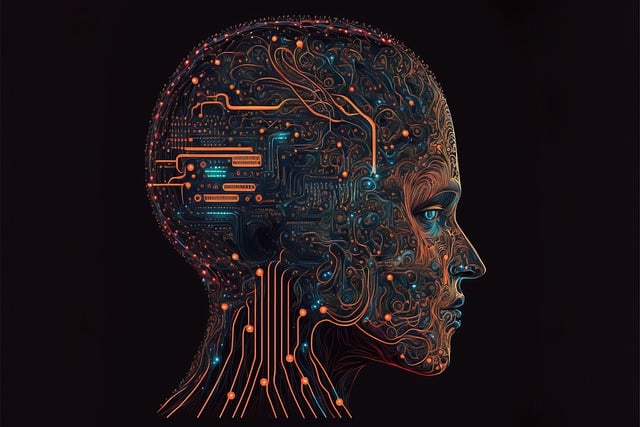AI-driven customer service bots are revolutionizing client interactions by offering quick, efficient, and personalized support 24/7, leveraging machine learning algorithms to analyze data and deliver tailored solutions. This level of personalization strengthens customer relationships, but implementing these systems requires strategic planning, high-quality data, and continuous improvement. While AI presents significant advantages like immediate responses and continuous learning, challenges such as ethical considerations, data privacy, and balancing automation with human intervention must be addressed for successful integration. Ensuring transparency, trust, and a seamless transition between automated support and human agents will be key to unlocking the full potential of AI in customer service.
In today’s digital era, AI-driven customer service bots are revolutionizing the way businesses interact with their clients. This article delves into the rising trend of artificial intelligence in customer support, exploring its impact on personalization and the overall customer experience. We discuss implementing effective AI systems, highlight benefits and challenges, and provide insights into the future of customer service, focusing on the power of personalized interactions.
From understanding consumer needs to streamlining support processes, AI bots are transforming traditional customer service.
- Understanding the Rise of AI-Driven Customer Service Bots
- Personalization in Action: Enhancing Customer Experience
- Implementing and Training Effective AI Customer Support Systems
- The Future of Customer Service: Benefits and Challenges
Understanding the Rise of AI-Driven Customer Service Bots

In today’s digital era, businesses are increasingly turning to AI-driven customer service bots as a game-changer in enhancing customer experience. These intelligent chatbots have become an integral part of many companies’ strategies, offering quick and efficient support to clients worldwide. The rise of AI in customer service is not just a trend but a necessary evolution, given the growing demand for personalized interactions.
AI-powered bots can understand and respond to customer inquiries with remarkable accuracy, learning from vast amounts of data to deliver tailored solutions. This personalized approach ensures that each interaction feels unique, addressing individual needs effectively. Moreover, these bots are available 24/7, providing immediate assistance and reducing response times, which is a significant advantage over traditional customer service methods.
Personalization in Action: Enhancing Customer Experience

In today’s digital era, customers expect seamless and tailored interactions with brands, and AI-driven bots can deliver just that through personalization. By leveraging machine learning algorithms, these bots analyze customer data, preferences, and behavior to offer customized responses and recommendations. For instance, a bot can remember a customer’s previous purchases or inquiries and provide relevant updates or suggestions, creating a unique and engaging experience. This level of customization builds stronger customer relationships by making interactions more meaningful and efficient.
Personalization goes beyond simple product recommendations; it involves crafting a conversational journey that mirrors individual needs. AI bots can adapt their tone, language, and content to match the customer’s preferences, whether they prefer a casual or formal approach. This attention to detail ensures that each interaction feels tailored, fostering a sense of exclusivity and satisfaction among users. As AI continues to evolve, brands can leverage these capabilities to create dynamic and highly personalized customer service experiences, setting new standards in customer satisfaction.
Implementing and Training Effective AI Customer Support Systems

Implementing effective AI-driven customer support systems requires a strategic approach. Businesses should start by defining clear goals and use cases, ensuring that the AI bot can handle high-volume, routine inquiries while freeing up human agents for more complex tasks. Data quality is paramount; feeding diverse, real-world scenarios into the system enables it to learn and adapt, providing accurate, personalized responses over time.
Training involves a combination of supervised learning—where human agents label and correct bot interactions—and unsupervised techniques like clustering and topic modeling. Regular updates based on customer feedback and interaction data are crucial for continuous improvement. This iterative process refines the bot’s ability to understand nuances, context, and individual needs, ultimately enhancing the overall customer experience.
The Future of Customer Service: Benefits and Challenges

The future of customer service is poised for a significant transformation with the advent of AI-driven bots, offering both promising benefits and unique challenges. These intelligent virtual assistants have the potential to revolutionize how businesses interact with their customers, creating more efficient, personalized, and accessible support systems. By leveraging advanced algorithms, AI bots can understand complex queries, provide instant responses, and learn from each interaction, continually improving their performance. This level of customization ensures that customer needs are met in a way that traditional call centers often struggle to match.
However, challenges remain. Implementing AI-driven bots requires careful consideration of ethical implications, data privacy concerns, and maintaining a balance between automation and human intervention. As these bots evolve to handle more intricate issues, ensuring transparency and building trust with customers will be essential. Moreover, managing customer expectations and providing a seamless transition between automated support and human agents will be crucial to the successful integration of AI into customer service operations.






